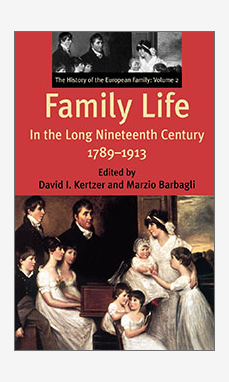This second of three extraordinary volumes on the history of the family in Europe focuses on family life and the forces that shaped it from the French Revolution to the First World War. The political and economic forces that transformed Europe in these years had a tremendous impact on family life. The contributors to the book examine the changing life experiences of ordinary people from a variety of perspectives and provide new keys to understanding the nature of the emerging modern European family.
How did industrialization, new technology, the growth of cities, and the revolution in transport and communication alter daily life? How did the family—the vital social unit that determined not only how and where people lived, but often where they worked—adapt to the demands of the new economy? The contributors explore these questions and more, illuminating the changes the nineteenth century brought about in the family and uncovering a fascinating diversity of family forms and family relations in different parts of Europe and distinguishing different social classes.
Various reviews have been written for the series (American Historical Review, Journal of Social History, Population, Rocky Mountain Review of Language and Literature, The Sixteenth Century Journal)
